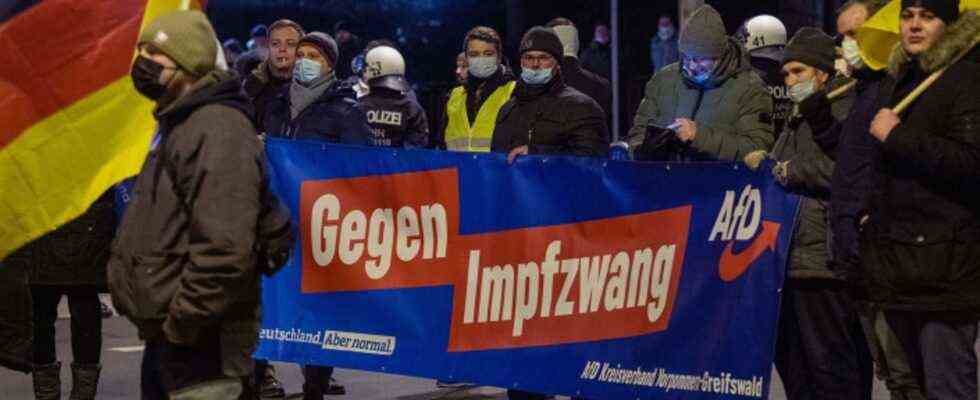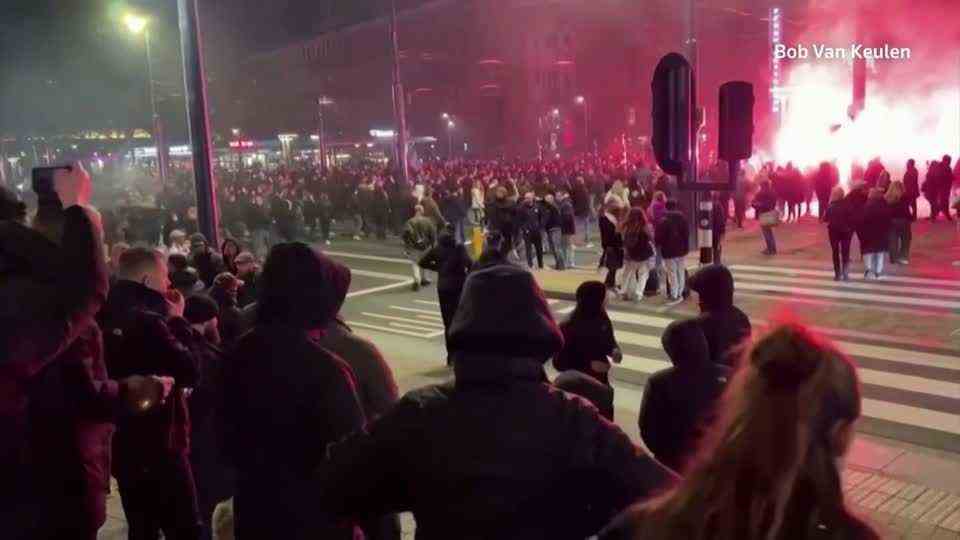Compulsory vaccination debate
Interior ministers warn of increased corona protests – and right-wing extremist demonstrators
AfD supporters demonstrate in Greifswald against the corona measures and a “mandatory vaccination”
© Stefan Sauer / DPA
There have been increased corona protests in several German cities in the past few days. There is growing concern that more and more right-wing extremists are mingling with the demonstrators.
For days, people in several federal states have been taking to the streets against the corona measures. In the event of a general vaccination requirement, interior ministers and constitutional protection officials are now warning of a further escalation of the protests. “Indeed, I fear that the mandatory vaccination could fuel the protests,” said Brandenburg’s Interior Minister Michael Stübgen (CDU) the newspapers of the editorial network of Germany (RND).
The interior minister from Saxony-Anhalt, Tamara Zieschang (CDU), agreed with Stübgen in the RND: “Since the beginning of the corona pandemic, it has been observed that tightening corona containment measures has resulted in more protests and demonstrations.” “This is a dramatic situation that has worsened again in the past few weeks,” affirmed Saxony’s Interior Minister Roland Wöller (CDU) in an interview with RTL. “We have to take note that the protest is increasingly charged with hatred and violence.”
Demos in several federal states
The protests continued on Monday. In Saxony, the police broke up unannounced demonstrations against the current Corona measures in several cities. Despite restrictions on the right of assembly, hundreds of people came together in Chemnitz, Freiberg and Zwönitz, among others, as the police in Chemnitz announced on Monday evening. Accordingly, a call was previously made on social media to take part in so-called walks against the corona policy.
In the neighboring country of Thuringia, the police stopped an elevator in Erfurt, which was joined by around a thousand participants. According to the police, two demonstrators were slightly injured “through the use of direct coercion”. The authorities in Schwerin also reported that in the evening “at the top” up to 400 people made their way through the state capital of Mecklenburg-Western Pomerania without having to register. They behaved “partly uncooperatively” towards the officials. The police filed charges for violating the Assembly Act, for resisting civil servants and for insulting and being sent off.
In Trier in North Rhine-Westphalia, the police said they were preventing an unregistered protest. Accordingly, around 100 people who wanted to move through the pedestrian zone had gathered on the forecourt of the Porta-Nigra. The police prevented that “through rapid and consistent intervention by the officers”. Here, too, the authorities initiated an investigation.
According to the RKI, these travel countries are considered high-risk and virus variant areas
16 images
Right-wing extremists subvert protests
The protesters’ threats are no longer directed solely against politicians such as the Saxon Minister of Health Petra Köpping (SPD), in front of whose private house demonstrators marched with torches. “We have also had threats against teachers, doctors and scientists at universities for a long time,” said Thuringia’s head of the protection of the constitution, Stephan Kramer, to the RND. “You can no longer put all of them under police protection,” he added.
The head of the protection of the constitution in Brandenburg, Jörg Müller, warned in the RBB that known right-wing extremists would infiltrate the demonstrations against the Corona measures. “I would not go so far that every citizen who takes part in a demonstration with such extremists also violates the free and democratic basic order,” said Müller. But well-known actors “like the AfD or the extremist association ‘Zukunft Heimat'” would always manage to bring thousands of people onto the streets.
Protection of the constitution for tougher crackdown on the judiciary
According to Bavaria’s Interior Minister Joachim Herrmann (CSU), there are not only more and more registered protests but also more and more unannounced protests. These “supposedly spontaneous” meetings would be advertised in relevant groups in the Telegram online service. The authorities are prepared for this, however, and would “punish violations of the Assembly Act just as consistently as they consistently report violations of the infection protection regulations.”
The Thuringian constitutional protection chief criticized, however, that the violations would only be treated as a “trivial offense”. He spoke out in favor of a tougher “crackdown” of the judiciary against the demonstrators. “It is necessary that there are also court hearings that are publicly noticed.” It is no longer about freedom of assembly and freedom of expression, said Stephan Kramer to the RND. “It’s all about intimidating and spreading fear. These people don’t need communication, they need a clear message.”


